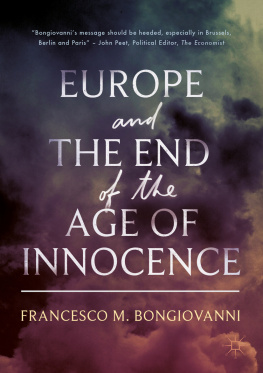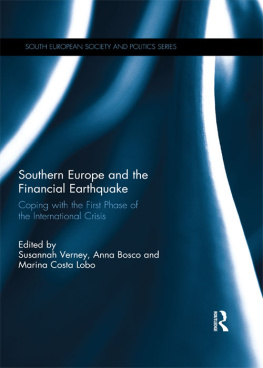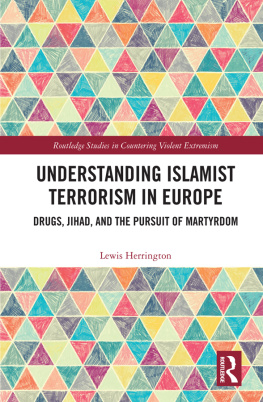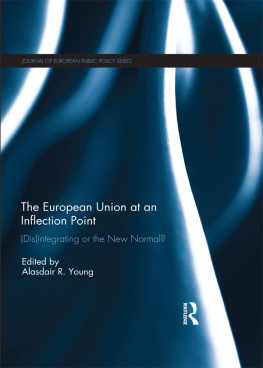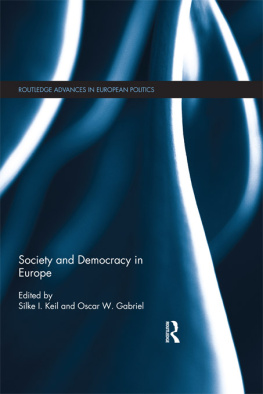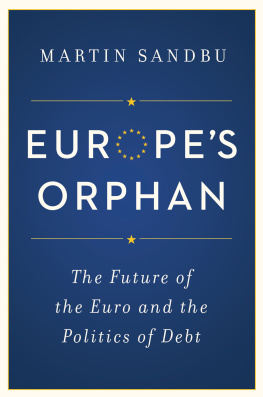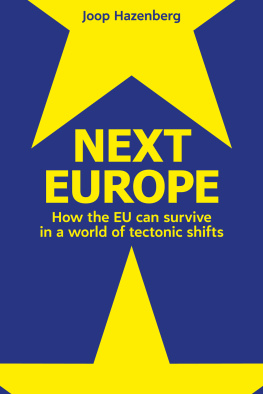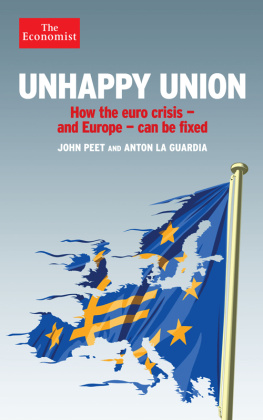1. Introduction
Apart from deserving my gratitude, anyone who read my first book, The Decline and Fall of Europe , is entitled to ask whether this sequel is really justified. Have things changed so much since the book was published in 2012 that a new one is necessary, or is this just the old dish being warmed up? To this legitimate question the returning reader needs a clear answeras much as I needed one before deciding to embark on this new writing adventure. The fact is, sadly, that there have been dramatic new developmentsmost as sudden as they were unexpectedwhich have caused Europe to find itself today on a significantly more worrisome trajectory than the one I had anticipated in my first book. Interestingly, some of the people who, back then, suggested that The Decline and Fall of Europe was too pessimistic now say it was perhaps not pessimistic enough. This change in mood reflects the simple truth that, since 2012, the situation in Europe has considerably deteriorated across many dimensions and the changes are starting to directly and visibly affect a vast number of people. On top of a general worsening in ways that had largely been predicted at the time, new developments have piled up that may take the continent into uncharted, dangerous territory. I am therefore afraid that the answer to the above question is that it is high time to re-examine the situation in Europe .
The Decline and Fall of Europe was intended to be a 360 degree tour, offering a balanced description of the European system and of the intractable challenges facing Europe, which were leading to inexorable decline across any dimension one cared to analyse. Among these, the transformation of the welfare state into the unsustainable Civilization of Entitlements that was bound to condemn parts of Europe to gradual impoverishment (which I have at times jocularly taken to illustrate as follows in my speeches: you can have long vacations or you can have the money for long vacations, but you cant have both); the crisis of a single currency built on a flawed architecture; the vast inefficiencies of the EUs Tinguely Machine and so on. The purpose of the book was to try to figure out what was really going on and where it could take Europe, concluding that the quality of life our children will know will be inferior to the quality of life we have enjoyed in the past half century. At the time The Decline and Fall of Europe was published, Europeans were still by and large in denial. Subjects such as failed immigration and integration policies, and the Islamization of Europe s open societies were still mostly considered taboo. A major publishing house I had approached about translating the book for distribution in France replied that while what the book said was true and mattered, the French were not ready to hear such truths. Similarly, publishers I approached in Germany, Italy, Spain and Scandinavia showed scant interest in translating the book for distribution in their own countries. It seemed that Europeans didnt really want to know (or perhaps they already knew everything, or the book wasnt good enough). The book therefore remained available only in its original English language and generally did much better in North America , the United Kingdom and Asia than in continental Europe . I was invited to give some speeches, lectures and TV interviews outside Europe. The point I am making here is that non-Europeans seemed far more interested in understanding the plight of Europe than Europeans themselves, whose main concern appeared to be to ensure that their privileged way of life would continue.
How much things have changed since then! Europeans have by and large woken up to the first tremors of the Titanic scraping against the iceberg. By early 2017 most of them were finally conscious of the frightening realities they were facing and recognized that there was no room left for blissful deniala sea change from their attitude five years earlier. Something had clearly evolved in the collective European psyche, and denial had given place to bewilderment, fear and anger. These feelings translated into the recent and spectacular rise of alternative politics across most of the continent, a development that could lead to dangerous territory if historical precedent is any indication. Europeans are now affected enough, worried enough, angry enough that they finally show significant interest in trying to understand what is hitting them (this will hopefully cause my books finally to be translated!). Consider, for instance, the controversial issue of the Islamization of European societies . New interest in this issue translated into the phenomenal success of Phillippe Houllebecq s 2015 book Submission , a political-fiction novel set in 2022 in a France governed by its first president from an Islamic party. One can agree or disagree with the relevance of Houllebecq s book, but the fact remains that it sold 120,000 copies in France in five days upon its January 2015 launch, and became a top seller in Italy and Germany as well. This awakening does not, however, necessarily mean Europeans will collectively muster the will and courage to take appropriate measures to steer the ship away from the iceberg, assuming one can figure out what the appropriate measures should be. Unfortunately, I see very little chance of this happening and profess complete trust in the ability of governing political elites to ensure that the ship holds its course steady to hit the iceberg, head on and at full speed. The reader will, by the way, notice that throughout this book the word elites (in the context of European or Western political elites) is set within quote marks, reflecting the difficulty I encounter in associating the mediocre class of people guiding the Western world today with the very word elite.
Allow me to confess something personal. Writing a book on Europe is quite demanding, particularly if one carries out ones own research, as I did for both books. This was all the more so in my case, since writing and researching takes away precious time from my interests in business and composing music. Unfortunately, not much money is to be made by writing such a book. So, my motivation had to come from some other direction. I wrote The Decline and Fall of Europe because of the shock I experienced when I came back from spending 15 years in the dynamic continent that is Asia only to find a Europe busy tying a rope around its own neck. I was then prompted to write Europe and the End of the Age of Innocence because the slow decay I had predicted in the first book appeared to have been replaced by a potentially swifter and more turbulent end game.
It seems that as Europeans are finally becoming interested in knowing more about their destiny and the reality surrounding them, they are realizing that they cannot rely on their political leaders, governments or the mainstream media to always tell the truth. Social media is not necessarily better. All of these players have been compromised, time and again caught lying, hiding facts, fabricating or manipulating information to advance their own interests or ideology-driven agendas. Having woken up from a long state of slumber and denial, the average European hungers for information but has become very suspicious of what he/she is fed, and rightly so. Written by an average European who put himself through the difficulties of trying to find out what was really going on, Europe and the End of the Age of Innocence is a small contribution to the need for a balanced and informative view, which I hope is laid out in a way that everybody can read and understand. To my readers, I should like to reiterate that I am no scholar, journalist, historian, political scientist or politician, nor do I harbour ambitions of becoming any of these. I am an ordinary man who decided to undertake a new journey of discovery to find out a bit more about todays Europe, put these findings on paper and share them with you. Once again, Trying to make sense of all the material turned out to be like one of these games where you connect the dots and slowly see patterns emerging. No one is entirely impervious to outside influence or can wholly shed his/her own education and background; yet I have attempted to write a book devoid of ideological bias, laying out the facts as well as I could given my limited research capabilities and, apart from a few instances where I cant resist venturing an opinion, I generally leave it to the reader to reach his/her own conclusions.

